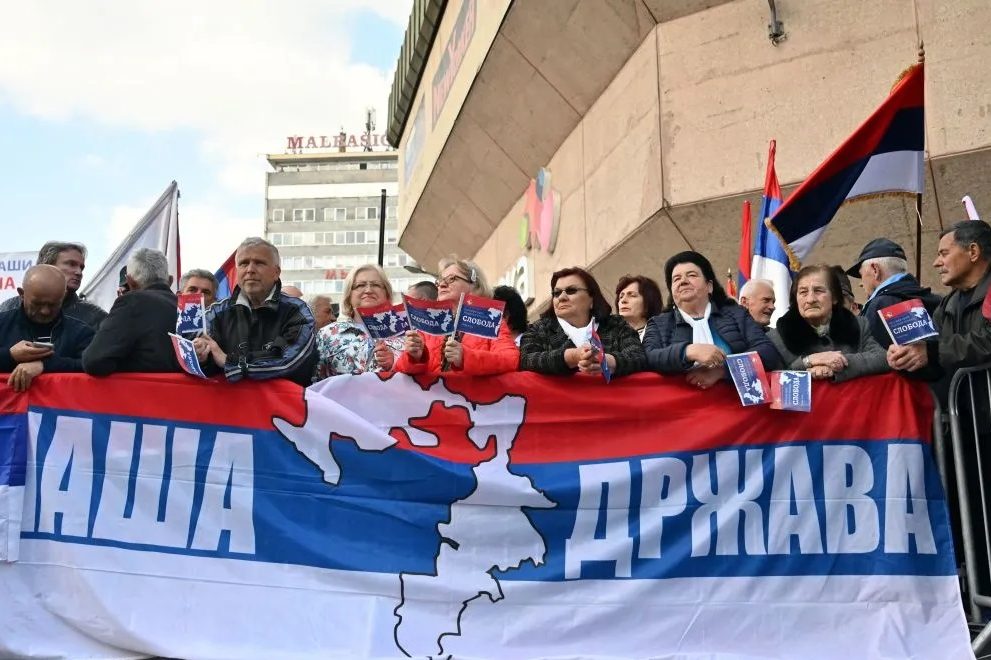If you fret about a democratic deficit in Europe, turn your mind for a moment to one European country with a very peculiar form of democracy indeed. In this country, divided into two parts which hardly deign to speak to each other, your right to vote, to be returned and in certain cases to stand for office, depends on your declared ethnicity. The presidency is split among three people, again chosen by law on ethnic lines.
The whole affair is presided over by a high representative, a kind of international proconsul (the present one is a softly-spoken German former agriculture minister). They possess almost plenary powers to change the law or the constitution by a stroke of the pen. Last year the incumbent calmly changed the electoral rules just after the votes had been cast in a general election.
The pantomime horse democracy currently embodied by this nation cannot be but a temporary measure
Welcome to the political madhouse of Bosnia-Herzegovina, a state where everything depends on whether you identify as Bosnian, Croatian, Serbian or “none of the above.” This is a place where almost the entire political system is set up to give each of these groups a veto over any meaningful measure the others may want to pass.
On Tuesday, in a decision which, for once, we should welcome with open arms, the European Court of Human Rights sensibly said this would not do. The case was brought by a Croatian intellectual by the name of Slaven Kovačević, living in Sarajevo, who preferred not to identify with any ethnic group. He made a couple of understandable points.
First, he said, he had no meaningful right to vote for his candidate of choice for president, because constitutionally only self-declared Serbs, Croats or Bosnians could run at all. Further, he argued that if his choice was a Serb he would be disqualified from choosing him because Sarajevo was not in the Serbian part of Bosnia-Herzegovina (one of the country’s two divisions, known as Republika Srpska, and not, of course, to be confused with Serbia proper).
Second, under the byzantine system of indirect elections for the House of Peoples, the upper house of the federal parliament, he again was constrained to vote for a declared Serb, Croatian or Bosnian at local level. This was because the upper house itself was legally divided on ethnic lines and its membership chosen by ethnic caucuses.
Without going into too much detail, the court had little difficulty in saying that, however bloody the history of the former Yugoslavia and however well-meaning the desire to change its course, a constitutional divvying up of an electoral system on racial or ethnic lines was contrary to the ECHR guarantees of a fair electoral system. It also, they also ruled, went against to an additional protocol (signed by Bosnia-Herzegovina, though interestingly not by the UK) guaranteeing a right to non-discrimination.
So far so good. But what now? Immediately, one suspects, not much. This is actually the sixth time since 2009 that Strasbourg has pronounced against aspects of the ethnically-based electoral system in Bosnia. All five earlier decisions remain unimplemented: the elaborate system of blocks and vetos which largely make up the Bosnia-Herzegovina constitution has ensured a stalemate. The betting must be on this one sharing the same fate.
What of the longer term? The difficulty is that, as one suspects most statesmen know but none dare admit, it doesn’t really matter what the European Court says. A non-ethnic electoral system is a non-starter for the simple reason that Bosnia-Herzegovina is not a viable state.
The entity was set up following Bill Clinton’s brokering of the Dayton Accords in 1995 as a means of ending the post-Yugoslavia carnage in Bosnia. The aim was to forge a kind of ever-closer union, supposedly guaranteed by a Peace Implementation Council of about forty countries, including the US, Britain and the leading EU states. That union has not come about.
One reason for this is historical memories. The Croat Ustasha’s atrocities against Serbs and dissident Bosnians in the 1930s and 1940s, and more recently the genocide of Bosnians in 1993 by Serbs at Srebrenica, have not been forgotten. Even between Bosnians and the (less numerous) Croats there is little love lost: the interference with last year’s election by the High Representative was an attempt to hold the ring between them.
More recently, the Republika Srpska has made no secret that it wants out. It has already passed unilateral legislation disavowing the legal force of judgments of the federal constitutional court, and annulled the orders of the High Representative.
True, the US and the EU maintain a polite fiction of this unified state as a permanent arrangement. The US has sanctioned some of the more thuggish Serbian partisans, and the EU last year dangled the carrot of EU candidate status, despite presumably realising that if push came to shove it would be lunatic to admit such a wasps’ nest into its bosom. Neither is likely to be very effective in maintaining unity.
Put bluntly, the pantomime horse democracy currently embodied by this fractious and factitious nation, and its control by an international civil servant-cum-technocrat wielding absolute power, cannot be but temporary belt-and-braces measures. It will have to end sometime. Moreover, for all the world’s pious insistence that nation-building must continue, the only plausible longterm answer is a break up, if necessary with some kind of international force keeping the peace between two or more probably three states.
Indeed, if you seriously believe in democracy rather than the pale imitation that currently passes for popular sovereignty in Bosnia-Herzegovina, your attitude should be that a breakup cannot come too soon. Who knows, an independent Bosnia or Herzegovina might well adopt a form of democracy that even the most demanding Strasbourg judge could not fault. Stranger things have happened.
This article was originally published on The Spectator’s UK website.

























